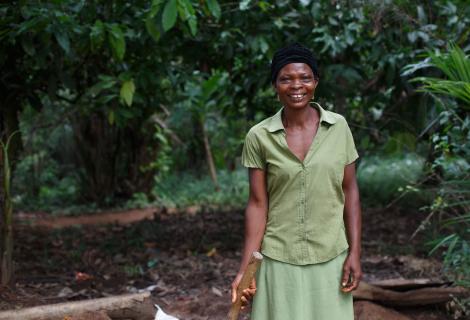ActionAid Ghana joins calls to halt the commercialisation of GMO foods to safeguard the livelihoods of smallholder farmers

(Accra, Wednesday 24th, April 2024) ActionAid Ghana joins stakeholders to reaffirm its stance against the proliferation of Genetically Modified (GM) foods. As a leading social justice organisation with a focus on advocating for sustainable farming practices that safeguard the interests and livelihoods of smallholder farmers across the nation, we are concerned about the ramifications of the government’s approval for the commercialisation of 14 genetically modified organisms (GMO) foods in Ghana.
We believe that the recent decision to lift restrictions on GMOs poses significant risks to food security, biodiversity, and the well-being of vulnerable communities. We acknowledge the importance of agroecology—a farming approach rooted in ecological processes to agricultural development and employment in Ghana.
Agroecology values indigenous knowledge, practices and empowerment of smallholder farmers, particularly women. By embracing agroecological principles, Ghana can build resilient and sustainable food systems that prioritise the well-being of its citizens and safeguard the livelihoods of smallholder farmers.
With the current economic challenges widening the poverty gap, AAG is calling on the government to prioritise agroecology as a sustainable farming approach and cease the commercialisation of GMOs in food production. Agroecology can guarantee meeting local food security needs, reduce deforestation, limit land grabs, support livelihoods, and thus contribute to Ghana’s economic growth.
For years, our smallholder farmers have been the backbone of our agricultural production, providing essential crops like maize and soyabean.
ActionAid Ghana believes that the decision to lift GMO restrictions lacked proper consultation, denying Ghanaians the right to voice their opinions on what they consume.
We believe that the National Biosafety Authority (NBA), which should act as a neutral regulator, has actively promoted GMOs, compromising its independence and Ghana’s national interest.
We would like to reiterate that food is a basic human right, and any decision affecting it must involve transparent public consultation in alignment with the position of Ghana’s constitution.
We therefore call for the following actions:
- The government should prioritise the precautionary principle and halt the commercialisation of GMOs until thorough research on the effects on human life and public consultations are conducted.
- The government must allocate funds to the Ministry of Agriculture to ensure adequate support for agroecological practices, training, and knowledge-sharing among smallholder farmers.
- The government should recognise the critical role women smallholder farmers play in food production and create an enabling environment for their participation and leadership.
Our urgent plea is an affirmation of our stance in solidarity with smallholder farmers, who are disproportionately affected by the adverse impacts of industrial agriculture.
-ENDS-